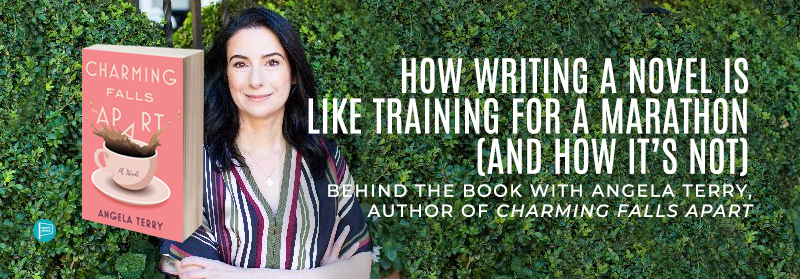
Not all writers are runners, and not all runners are writers; but those that are both like to make the comparison between writing a novel and running a marathon. You can’t train for a marathon or write a novel overnight. Each takes major commitment, self-discipline, stamina, determination, and a healthy amount of carbs to keep you fueled. As a runner and writer, the way I approached and finished writing Charming Falls Apart wasn’t too dissimilar from my marathon training plan.
-
The first steps / words:
The first step is figuring out your plan, how to fit it into your schedule, and then sticking to it. Training for a marathon consists of a series of runs leading up to race day, and similarly, writing a novel involves consistently adding words to the page until “The End.”
A friend of mine who recently ran her first marathon admitted that she found the training pretty easy, she simply added an extra mile to her long run every Saturday. A person who has never put on a pair of running shoes is a lot like a first-time novelist looking at a blank screen—the novice runner needs to build up their mileage and the novelist, their word count. I know some writers who do “sprints” and write 10k words a day, but I’ve heard a lot more authors say that they aim for 1-2K words a day. If the average novel is 80k words, then by 10 weeks you will have a first draft.
But also start where you are: if that is at 500 words a day, continue that for a week, and then bump it up to 600 the next week, and so on. Every mile and every word will bring you closer to the finish line.
-
Technique and Editing:
While the ultimate goal of marathon training is to build up mileage gradually so that your body can handle that final 26.2 miles come race day, training plans usually involve shorter runs to work on speed, hills, cross-training, and techniques that will help your running form, prevent injury, and crush your personal record. While you’re building your 80K novel, you will need to edit, polish, expand some plotlines and tighten up others, to make your story stronger. Just like reading articles on running, read some writing books or take a webinar to help you learn the skills to self-edit and test out some new techniques. Work on your writing and editing skills so that every word moves your story forward.
-
Motivation / The Dreaded Middle:
During training there are days you when you just don’t want to run–you’re tired, it’s raining, etc. This typically occurs in the middle of training when the runs get longer, yet race day feels so far away. These are the days you need to lace up your shoes and get out the door. There will be many days when you don’t feel like writing; inspiration has left the building. For me this happens during the dreaded middle, when the creative excitement at the beginning of the process has faded and the end of the novel still feels out of reach. And these are the days you need to put your butt in the chair.
Jane Green, one of my favorite authors, has said that she writes 2,000 words a day. And if she doesn’t feel like it, it doesn’t matter. She sits at her computer and doesn’t leave until she finishes her word count. She’s written 20 novels, 17 of them New York Times best sellers. So, if you don’t believe me, then listen to Jane Green.
But like running, sometimes you need to listen to your body. And if days of writing have gone by where you’ve tried to push through but have deleted more words than kept, then take a break. This is the perfect time to read about writing or take that webinar. Or even just take a walk, or anything else that will let your subconscious work on that tricky plot point. But be honest with yourself when it’s time to get back to your novel. Writing is a muscle and a skill—use it or lose it.
-
The Finish Line / The End:
With a marathon, there’s a hard deadline—race day. You show up at the appointed time, find your corral, and when the start gun goes off, you don’t stop moving until you cross the finish line. With the marathon, there is no did you or didn’t you. You either crossed the finish line and collected your medal or you didn’t. This is where writing your novel diverges.
If this is your first novel, there’s not always that hard deadline, and so whether your book is complete is subjective. But when you’ve moved that comma on page 166 for the fifth time or find yourself wordsmithing same sentence for the umpteenth time, you are done. If you feel that you’ve done all you can do with your manuscript, then it’s time the type “The End.” This is when you pass it along to someone else, whether it’s an editor, an agent, a publisher, or your best friend, and it will go on to its next stage toward publication.
But here’s where the feeling is the same: Once you cross the finish line, all those weeks of training and pain endured culminate into a euphoric moment: you did it! For me, the same is true when typing “The End.” The sacrifices and mental energy that goes into writing can be exhausting at times, but the reward is so worth it. A lot of people talk about writing a novel and a lot of people talk about running a marathon, yet only a handful do.
Be the one who finishes.

Leave A Comment